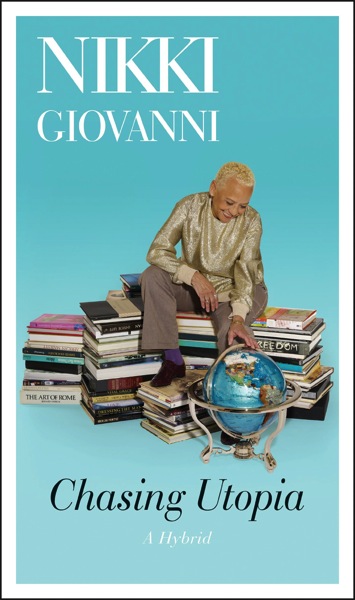In a recent Facebook post I mentioned reading more poetry recently (as a preface to quoting Rudyard Kipling’s If). I’m not sure how Kipling brought me to finally reading some of the work of Nikki Giovanni, but I’ve just finished two of her poetry books back to back and enjoyed each immensely. First I tasted her newest, Chasing Utopia: A Hybrid, and then went back to her earlier book, Bicycles, which ends with the poem “We Are Virginia Tech”, a poem she delivered at the memorial for the students who died during the Virginia Tech massacre in 2007 where she taught poetry.
I hated to realize that’s the event that brought her work to my attention, but it is, and if poetry is about truth then so, too, should a review of a poet be about truth. Truth is what I found in her work as well as a truly original and inclusive voice. I say both original and inclusive because she spoke from her own reality – that of being an African American female who grew up in Ohio, studied history in college and works as a college professor and professional writer – but inclusive because if you take the “African” away from “African American” then every thing I used to describe her, describes me, and her work reminded me so much more of our similarities than of our perceived-by-society differences. True, her frequent references to African American leaders and culture would catch me off – I knew to whom she referenced (I spent my college years wrapped up in Prince mania) but kept realizing she is one of the few poets I’ve read who uses such references primarily and I knew that some people would find that exclusive. Yet all her poems about love and loss were universal, especially “Love (And the Meaning of Love)” from Bicycles, which called up memories of teenage angst over the one great question we all had:
I wanted to
But you couldn’t
I hoped
But you wouldn’t
I understood
Why we shouldn’t
So you declined
And we didn’t
But it would
Have been fun
If we would’ve.
What I most like about this poem is her ability to sketch out such deep emotion through the efficient use of such simple wording. She does that again and again. I a poem also in Bicycles called “I Provide” she lists all the things one lover provides to the other and ends with:
Everything you need
I provide
Now tell me
Why
You’re not happy
Giovanni uses word layout similarly to one of my favorite poets – e.e. cummings – without employing his love for radical spelling and grammar. Her poem “Everything Good is Simple” seems to sum up her writing right there in the title.
In Utopia I found more evidence of her earlier, more political writings, the ones that brought her originally to the public’s attention. Poems like “Note to the South: You Lost” (which I intend to send to all my Civil War historian friends as a fun thing to let their students ponder: why if they lost – and after fighting for such a horrendous cause — do we still admire them so?
Giovanni also considers her poetry – and by extension all writing – political in her piece “The Significance of Poetry”. In Utopia she writes about jazz as political fodder and about the blues and even the act of loving as a political choice (who, when, how). I found her work wonderful to ponder and her words wonderful to wander, probably due to the truth behind the lines in “Werewolf Avoidance”:
Poets should be strong
In our emotions
And our words that might make us
difficult to live with but I do believe
easier to love
Poet it garlic
Not for everyone
But those who take it
Never get caught
By werewolves
Hear more on Nikki Giovanni in her NPRinterview on Tell Me More (from Tuesday July 29, 1014)
* A portion of each sale from Amazon.com directly supports our blogs
** These books might also be available from your local library, Check it out!

